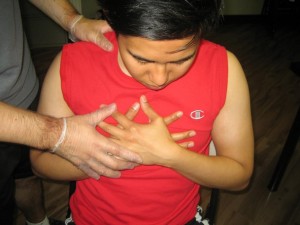Gastroesophageal reflux is a physiological occurrence that happens when there is a backward flow of gastric material into the lower esophageal symptom in the esophagus. The esophagus acts as a passageway, where the food passes from the pharynx to the stomach. Every time a person swallows, the muscular lower esophageal sphincter (LES) relaxes for several seconds to allow the food and water into the stomach before closing again. When the LES relaxes, this is the window for acid to reflux into the stomach.
Gastroesophageal reflux can occur at different times of the day without leading to esophagitis, heartburn or other symptoms. In fact, gastroesophageal reflux is usually asymptomatic as it occurs only for a brief period of time. Gastroesophageal reflux is the same as acid reflux.
Gastroesophageal reflux may progress into a more severe form of reflux, gastroesophageal reflux disease (GERD). If the symptoms of the reflux occur more than once a week, it may be a symptom of an underlying disease already.
Risk Factors of Gastroesophageal Reflux
Certain factors may increase an individual’s risk of developing symptoms of gastroesophageal reflux.
- Obesity – leads to increased acid secretion and increased intragastric pressure
- Pregnancy – hormones lead to relaxation of muscles of the body
- Eating large meals – promotes acid build up in the stomach
- Eating meals before sleeping
- Lying down soon after eating a meal – it is best to wait three hours before lying down
- Eating too much chocolate, peppermint and fried and fatty foods
- Drinking too much carbonated beverages, juices rich in citrus, alcohol and caffeine
- Smoking
Symptoms of Gastroesophageal Reflux
Although gastroesophageal reflux is physiological, it may sometimes present with symptoms, such as:

- Taste of bitter liquid or regurgitated food at the back of the mouth or throat
- Heartburn – warm, burning pain or discomfort behind the sternum
- Trouble swallowing
- Sore throat
- Voice hoarseness
- Nausea that may be accompanied by vomiting
- Increased burping and hiccups
- Bloating
- Dry cough
- Wheezing
- Blood stools
First Aid Management for Gastroesophageal Reflux
There is no need to seek immediate medical attention for cases of gastroesophageal reflux as it is not a medical emergency, and can be treated at home with proper treatment and management. To learn how to apply basic first aid for everyday medical encounters, enroll in First Aid Courses. To relieve of symptoms of gastroesophageal reflux, if any, the following steps are recommended:
- Do not bend or lie down to avoid exacerbating the pain. Stay seated upright, if possible.
- Try to identify what triggers the excessive relaxation of the LES. Once identified, avoid these triggers.
- Opt to eat smaller meals but more frequently within a day.
- Take over the counter antacids to help neutralize the acidity of the stomach’s juices.
- Medications are available to decrease acid production. These H2 blockers include cimetidine, nizatidine, famotidine and ranitidine.
- Proton pump inhibitors medications are also available to heal esophagitis and to stop the production of acid altogether
Gastroesophageal reflux is a common occurrence in the body that is usually asymptomatic and does not pose harm to an individual unless it progresses to its severe form.
